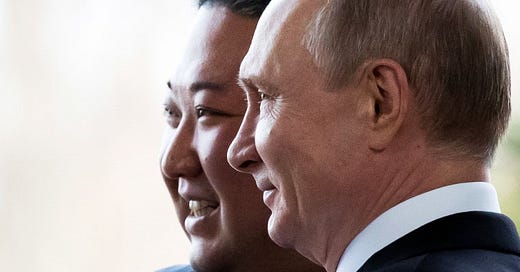Vladimir Putin has put together an impressive, maybe frightening, alliance of Russia, China and now North Korea to confront the US, EU, Japan and South Korea. His Ukraine invasion has, if nothing else, proved a catalyst. The initial beneficiary was China, on which he now relies diplomatically, and now the otherwise isolated Kim dynasty in Pyongyang.
It is unclear as yet whether Putin’s main purpose is to get basic weapons for a stretched Russia from an arms-rich but otherwise desperately poor North Korea, or to frighten the US and its allies with such an alliance with an unloved state with missile as well as nuclear weapons. Perhaps it is a combination of both for a Putin who needs any friends he can get.
It is certainly a triumph for Kim Jong Un, who can otherwise only boast of bombs and rockets with hunger hardly a distant memory for many of the dynasty’s people. Not only does it bring prestige and a powerful friend but one who can buy his weapons and help out with grain supplies when needed.
North Korea now seems to matter in practice, not just on the theory that having nuclear weapons and delivery capability makes it vastly more important than location, population and economy would otherwise suggest. Hitherto arms development, nationalist rhetoric and a barrage of lies about the outside world have protected the Kims, but not done much more. There is not much downside in his journey to Putin-land and the chance that he can lever this into broader international standing which could bring concessions on other issues from the US and South Korea.
Some in China may see it that way too. Xi Jinping’s focus on confronting all things western, genetic as well as cultural, political, and economic, may be happy with this, however much contempt that Xi keeps barely hidden for Putin’s Russia. The Chinese most recently demonstrated their disdain for Russia, for instance, with the release earlier this month of the China Standard Map 2023, which in addition to claiming larger bits of Southeast Asian waters and a chunk of India, claimed all of the 350 sq km. Bolshoi Ussuriysky Island, which sits at the confluence of the Ussuri and Amur border rivers, and whose ownership has heretofore been legally shared between China and Russia, without notifying Moscow.
But other Chinese see this arrogance as likely to further cement newfound ties between South Korea and Japan and generally underpin the sense in much of Asia that imperial power US is more protection than threat when viewed again the Russia-China-NK combo.
Students of history in Beijing are well aware of the Korean record of playing more powerful neighbors against each other, well aware of the strength of Korean nationalism, and of the ambiguous role that Pyongyang played in the six decades after the death of Stalin and the end of the Korean war (1952 and 1953 respectively).
China’s Wolf Warriors may applaud what they see as another setback for US-aligned interests and proof that the future lies with a China-led Asia. But those concerned with China’s now-global interests may not be so happy. Apart from power politics, much of that world is well aware of the contrast between North Korea and South Korea, land of smart gadgets and popular entertainment.
The Chinese, like the Japanese and Koreans, have long been uneasy about the presence of Russia in the Pacific. That is now long established. Russians reached and settled (by land) on the Sea of Okhotsk in the mid-17th century. Thus those who think longer term may see that the Putin-Kim meeting at the Vostochny Cosmodrome has a significance far beyond the immediate issue of the Ukraine war and US-China rivalry. The Cosmodrome is a short train ride from North Korea and lies in the Amur district, part of Russia’s territorial gains from the Qing dynasty under the so-called “unequal” Treaty of Aigun 1858 and confirmed by the Convention of Beijing 1860. Russia also has what are now the largest cities in its Far East region, Khabarovsk and Vladivostok.
The Putin-Kim meeting will certainly make Japan and South Korea think about how quickly they can, if needed, acquire nuclear weapons and delivery systems should the need arise. President Biden has strengthened US diplomatic and strategic ties in the Indo-Pacific but doubt about long-term commitment remains, particularly given the possibility of a return to office by Donald Trump. He has had summits with Kim Jong Un in Singapore in 2018 and Hanoi in 2019 which achieved nothing beyond giving face to Kim. Now Kim is getting his moment.





Why must the alliance be ominous?? Just because the US thinks so? ? Hasn't the writer his own thoughts on the matter?
❤️❤️❤️🙏🏾👏🏾🫶🏾🇨🇳🇷🇺🇰🇵